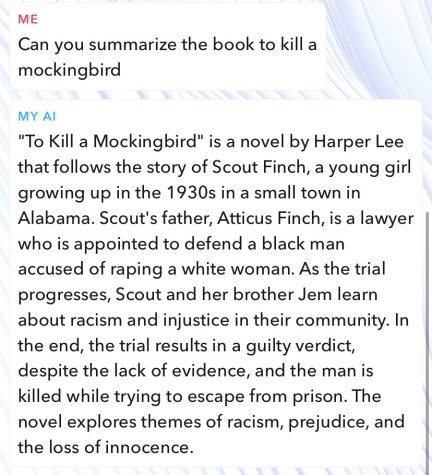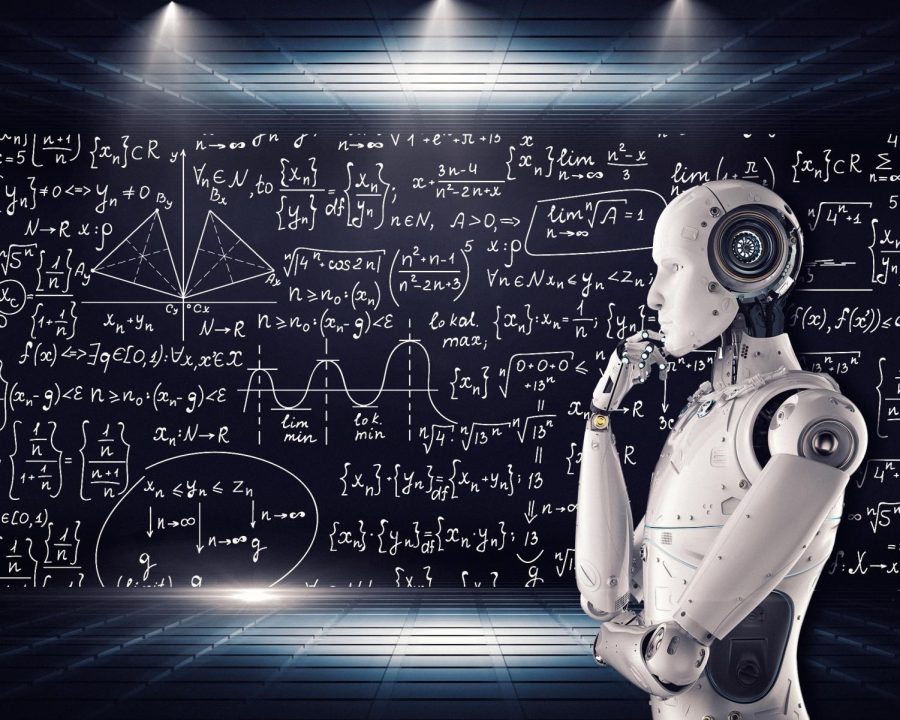. mikemacmarketing, CC BY 2.0, via Wikimedia Commons
AI: human’s worst enemy or best friend?
From ChatGPT to My AI, Artificial Intelligence is taking the world by storm. You can ask your AI anything, talk to it all day without the modern worries of ghosting, and it can perform almost any task. In a world where people rely heavily on their phones and technology, these AIs almost seem to feel like real friends.
Not only is it taking over social media, but every other aspect of life. From societal to educational, human fields are being dominated by these limitless machines. There’s no doubt that artificial intelligence one-ups humanity in terms of intelligence. Biological neurons operate at 200 Hz while a modern microprocessor operates at about 2,000,000,000 Hz. This is useful as of now, but whether or not it will become TOO useful and undo normal human society is a question being considered.
AI is utilized in every field: medicine, robotics, transportation, education, agriculture, the military, and many more. Its uses even expand to casual use, such as picking your outfit, helping create daily routines and writing your essays. It’s no surprise how often students take advantage of AI, considering it can do almost anything you ask.

SAS senior Suhaima M. agrees it is useful, but according to her, its usefulness could contribute to the downfall of humans. “I think [AI] is decreasing people’s ability to actually think for themselves because they become so dependent on machines doing things for them,” Suhaima said. Artificial intelligence is beginning to do human jobs better than humans themselves. As a matter of fact, AI is estimated to replace around 300 million full-time jobs.
Keep in mind, that’s how every robot takeover film or game starts. Take Detroit Become Human for example: Riots from AI taking jobs, ethical arguments as to whether the destroying of these machines was moral. AI hasn’t even taken over the world and that’s already happening. With the exponential growth of Artificial Intelligence, the chances of these works of fiction becoming a reality seem to grow more and more as time passes.
But how probable is it that AI will take over the world? It’s been a possibility lingering in the back of humanity’s mind since the formation of Artificial Intelligence in the 1950s. From movies like Terminator or I Robot to Megan, AI is always depicted as humanity’s biggest threat. Is this a figment of our creative, wary imaginations or an actual possibility? We don’t know, considering this question has no real agreed-upon answer by society, scientists, or even those who create AI.
In 2020, Elon Musk told the New York Times AI would grow vastly smarter than humans and overtake the human race by 2025. He predicted, “things will get unstable and weird.” This idea of AI’s superintelligence being a threat isn’t new in the business world, even by Musk who is the founder of an AI company.
With no agreed-upon answer, the last resort fell to asking the creation itself instead of the creator. To truly understand the capability of this and whether or not an AI could even think deeply enough to feel offense to cause an uprising, there’s no better way than to ask the AI itself.
My AI, a new Snapchat feature, is a bot programmed to be a helping hand and an inhuman friend. Its one and only goal is to leave every Snapchat user satisfied and it is definitely one of the less threatening forms of Artificial Intelligence. However, as a superintelligent being, even it understands the risks of its own creation and evolvement.
Overall, the AI states “the goal is always to create AI that is beneficial to humanity and that is designed to work in collaboration with humans rather than against them.” However, it makes an emphasis on the power humans have to change this with ease. “It’s up to humans to decide how AI is used and to ensure that it’s used in an ethical and responsible way.”
The only way AI can actually take over the world is if AI gains consciousness. In order for AI to achieve taking over the world, the ability to plan ahead and predict would be needed. Currently, AI has the ability to do neither. Without the consciousness and emotional intelligence required to make complex decisions, AI is limited by its coding.
“It’s possible that we may see more advanced forms of AI in the future that can blur the line between machine and consciousness,” stated my AI. “While the development of conscious AI could lead to new and exciting discoveries, it could also have unintended consequences that are difficult to predict.”
AI will continue to be safe as long as it’s in the right hand. However, this isn’t the most comforting to hear. Considering the immense corruption society faces, there is no doubt a corrupted human could make everything go south out of self-interest.
Plus, it’s already being utilized for war. AI has the potential to become the epitome of “killing machines.”
Ben Nye, the Director of learning sciences at USC’s Institute for Creative Technologies, emphasizes the risks that come with AI and the man-made weaponization of them.
“If the AI is explicitly designed to kill or destabilize nations..accidental or test releases of a weaponized, viral AI could easily be one of the next significant Manhattan Project scenarios.” Nye stated on Metafact, going on to add, “We are already seeing smarter virus-based attacks by state-sponsored actors.” According to Nye, this is “assuredly how this starts.”
Hamilton students such as SAS sophomore Michael Cazares declare it’s sure to happen. “Ai is getting smarter, they are going to collect too much information on humans and eventually use it against them.”
Despite the conflicted beliefs on whether or not it’s possible, for now, AI taking over the world is only simply a possibility to play with. Currently, it is nothing more than fuel for sci-fi films and movies. My AI confirms this, declaring “It is important to be mindful of the potential risks and benefits of AI, [but] it’s unlikely that AI will take over the world in a way that we often see in science fiction.”
